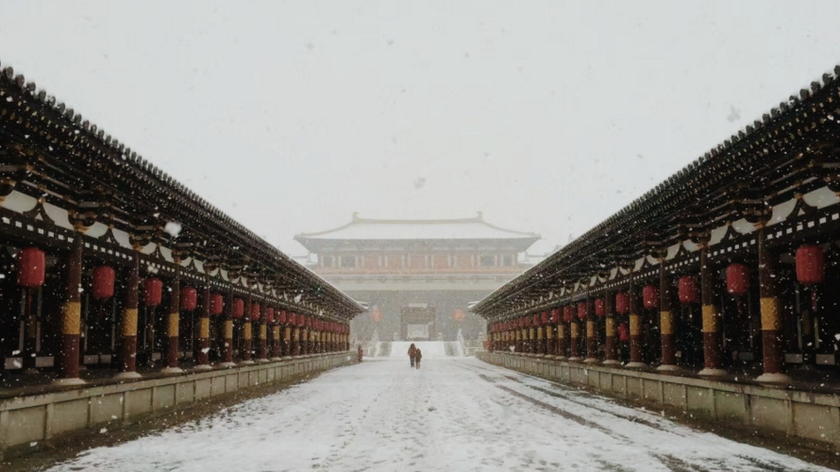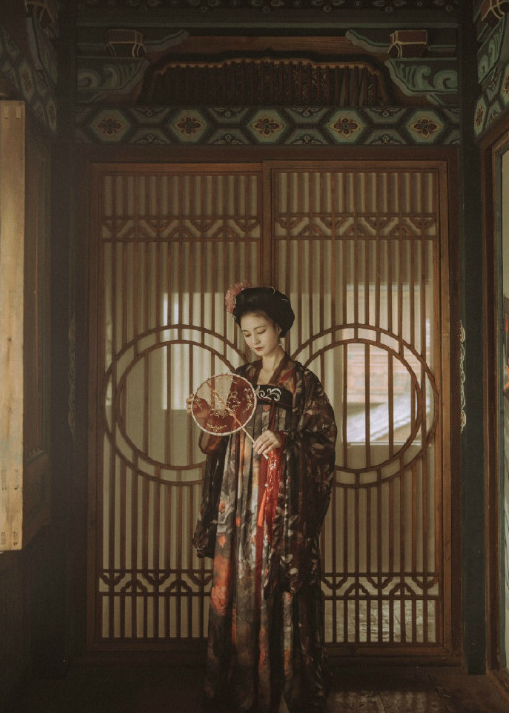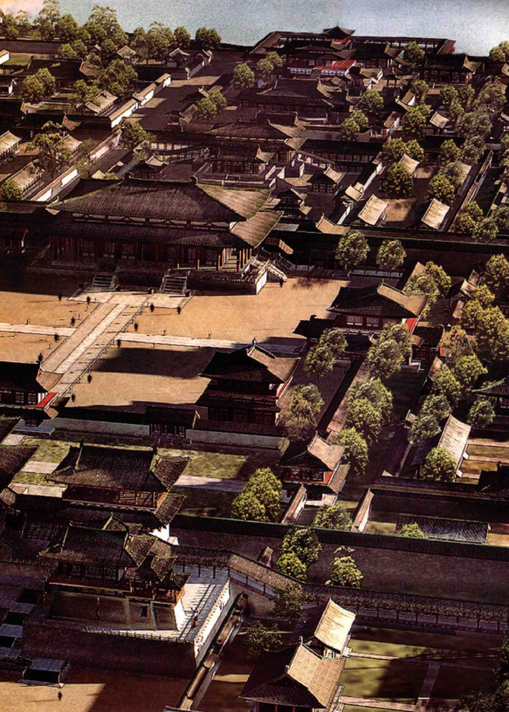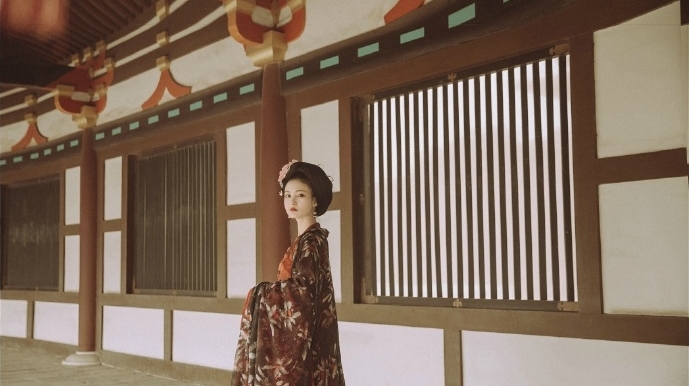Heartbreak in the City: A Review of Eastern Palace

The Eastern Palace is more dangerous than the Imperial Palace. Compared to being emperor, being crown prince is more difficult…
—Li Cheng Yin, Eastern Palace by Fei Wo Si Cun
Happy New Year!
Before I get going with my next translation project, I wanted to share some thoughts about a novel that’s been on my mind: Eastern Palace (東宮 // Dong Gong), published in 2010 and written by Fei Wo Si Cun (匪我思存). A drama adaption, Goodbye My Princess (2019), starred Chen Xing Xu and Peng Xiao Ran in their breakout roles.
Eastern Palace is a complicated romance between two young lovers who are destined to meet and fall in love time and time again, yet fated to get torn apart no matter what. The story’s structure and overarching premise is very much like Tang Qi’s Ten Miles of Peach Blossoms, but without immortality as a fail-safe. If Peach Blossoms is hurt/comfort, then Eastern Palace is pure hurt. I’m not usually one for tragedies, but this one has kept me reeling in its wake.
A word of warning that this post is rather lengthy, sitting somewhere between review and recap. Spoilers are present throughout, but stop at the warning if you want to avoid the major ones. After that, I start diving into scenes and plot points that were pivotal to me as a reader.
For those interested in reading, there is an excellent English translation by Michelle as well as physical and digital versions of the original text on Amazon. Ximalaya also has a radio drama available for listening.
The Backdrop
Eastern Palace doesn’t specify a time period in history, but based on certain events in the novel—including the decimation of the nomadic Tu Jue (突厥 // Göktürks) and that its ruling family is surnamed Li—the setting may have been inspired by the Tang Dynasty, perhaps the most prosperous dynasty in Imperial China. To put this wealth in perspective, Da Ming Palace, the imperial palace of this era, is 4.5 times the size of Beijing’s Forbidden Palace. For those interested in learning more, here is a great read revolving around Chang’an, the capital of the Tang Dynasty.
Anyways, what we do know is that the central dynasty is an ethnically Han empire located in Zhong Yuan (中原 // Central Plains), which is an important region in Ancient Chinese history. Zhong Yuan is situated close to the Yellow River and has been described as a cradle of life for Chinese civilization. It’s also used to describe Chinese civilization and China proper.

In the novel, there are many non-Han kingdoms in the Western Region, including Xi Liang (西涼 // West Liang) and Tu Jue. These kingdoms appear independent with their own armies, culture, and socio-economic structures, but in reality, they are near subservient to the more powerful Zhong Yuan. Since these kingdoms have such different cultures and lifestyles, they are looked down upon and considered them “barbaric” and “uncivilized.”
Our heroine, Xiao Feng, is a princess hailing from Xi Liang while her love interest, Li Cheng Yin, is crown prince of Zhong Yuan. The story primarily takes place within Shang Jing, Zhong Yuan’s capital city. The Eastern Palace, where she resides, has canonically been referred to throughout history as the residence of the heir apparent within the Imperial Palace.
Whether intentional or not, I appreciate that the author uses Xiao Feng as a vessel for offering some social commentary on xenophobic tendencies in Asia, since prejudice against ethnic minorities is sadly, still very prevalent.
The Heroine
The story is narrated by Xiao Feng, the sweet and spoiled ninth princess of Xi Liang. At the start, she’s already married into Zhong Yuan and has assumed the title of crown princess. Characteristic of many women from her tribe, Xiao Feng is free-spirited, brutally honest, and adorably naive. She’s also temperamental, irresponsible, and proud.
Although Xiao Feng’s been pampered her entire life, her desires in life are simple: She wishes for nothing but a life back home with a man she loves, raising livestock, and living on the land. What I love about Xiao Feng is her unwavering moral compass. No matter what, she’ll always follow her heart and remain fiercely loyal to those she cares for.
Unfortunately, this makes her a poor candidate for life within the Eastern Palace, a place notorious for the scheming that goes on behind closed doors. Furthermore, Xiao Feng’s unruly and lazy personality is constantly landing her in some type of mess—many of which come with very real consequences.
From the get-go, many parallels can be drawn between Xiao Feng and Bai Qian, the similarly sassy heroine in Ten Miles of Peach Blossoms. Nevertheless, I’d venture to say that Xiao Feng is more fleshed out and relatable than Bai Qian, who can seem unrealistically perfect.
Quick Digression: Bai Qian is the picture of an inoffensive but likable female lead. Because of her lack of complexity and relatable character flaws, she tends to fall flat. Sometimes, feels as if Tang Qi is telling us that Bai Qian’s only downfalls are that she’s too beautiful and too devoted. Like, what?! Also, despite her proclaimed intelligence, she that rarely outshines the men in the story. Whenever she’s in a pickle, she hardly ever has to make a difficult choice—there’s always a handsome man conveniently there to save the day or help her figure out how to do it. I think this is why the drama adaptation was more well-received than the novel. The shift in focus to other characters puts less pressure on her underwhelming character development.

On the other hand, Xiao Feng’s problems are never miraculously resolved. Our plucky but dumb gal is as dense as Bai Qian, but it’s more or less justified: She’s a teenager who’s been thrust into the capital city of a foreign nation, forced to accept a role she’s been never prepared for. And unlike Bai Qian, Xiao Feng is not blessed with her people’s universal reverence nor does she possess the finesse to charm her way out of sticky situations.
Though she lacks practical skills and is prone to dramatics, Xiao Feng’s biggest fallacy is actually her naïveté. She sees the world in black and white—good and bad—missing all the layers of gray in-between. And it really doesn’t help that all the men in her life are all highly unreliable. The only one Xiao Feng can really trust is her best friend and loyal servant, the mute A’Du.
Her Lover
Li Cheng Yin is that guy that you love to hate. He’s ruthless, calculating, and uses the people around him as pawns. His tendency towards placing Xiao Feng, and even himself, in danger in order to advance his designs for power can be downright repulsive. This mans is truly going straight to hell and not even his love for the heroine is enough to earn him salvation.
In the beginning, Li Cheng Yin actually doesn’t seem so awful. Oh, he’s definitely an ass, always picking fights with Xiao Feng and accusing her of scheming against his beloved consort, Zhao Se Se aka Zhao liang di. But the man has a devilish charm of his own. Once his stone-cold facade starts cracking, he’s actually quite endearing. It’s especially hard to not feel for him when you see his bumbling attempts at expressing his newfound affection for Xiao Feng.
Caveat: He sucks at courting women and we support her irritation.
We also come to learn that Li Cheng Yin has a sad story of his own. It’s an ugly truth that proves how he’s never experienced the warmth of unconditional love, which makes Xiao Feng’s pure and innocent affection all the more alluring to him.
Nevertheless, no one makes it to a position of power without learning a few nasty tricks on the way. Li Cheng Yin is no exception. It’s incredible how well he’s able to exploit others. Everyone, even those closest to him, is just a means to an end. Have I mentioned how much we hate him?

In a way, it makes sense that Li Cheng Yin doesn’t know how to properly cherish Xiao Feng, always resorting to underhanded means to keep her close when he feels that she’s slipping out of his reach. If he grew up in an environment where one must manipulate to get what they want, how could he even begin to understand how to cherish someone else?
At first, it’s hard not to root for him because it’s so wildly obvious that his heart lies with Xiao Feng, but he only has himself to blame. You keep waiting for that moment of catharsis wherein he redeems himself and all the pieces finally fall into place, but as the story progresses, it becomes increasingly unclear whether any amount of repenting will ever be enough.
The Set-Up
Eastern Palace starts three years into Xiao Feng’s politically-fueled marriage to Li Cheng Yin. Xiao Feng is absolutely miserable in Zhong Yuan. Unlike the freedom of Xi Liang, this unfamiliar place is all strict customs, false pretenses, and scheming.
Xiao Feng has a hard time taking to life in the palace. Part of it is because of culture shock—she married into a foreign country with no knowledge of its language or customs. Her attendant often has to educate her on etiquette and speak in her place when she can’t understand what others are saying. (Narratively, this was a good move on Fei Wo Si Cun’s part, as much of Xiao Feng’s ignorance towards the things happening around her can be attributed to her literally not understanding what’s happening around her.)
Far from home, Xiao Feng is lonely and has no connection to said home other than her mute handmaiden, A’Du. Both want nothing more to return to Xi Liang, but for a royal daughter who’s been shipped away from home for the sake of a political alliance, this is impossible. On good days, they get to sneak out of the stifling palace environment by dressing as young lads. Their tomfoolery usually ends up putting them in some type of trouble before they get caught and escorted home by General Pei Zhang, Li Cheng Yin’s right hand man. Despite being loyal to the prince, Pei Zhang seems to sympathize with Xiao Feng and is kind enough to humor her during these excursions, cleaning up her messes and helping conceal her identity in times of crisis.
But this can only only do so much to lift her spirits, especially when her broody and emotionally unstable husband is constantly spoiling her mood. Things are so bad between the two that they’ve never even consummated their marriage—on their wedding night, Li Cheng Yin entered her chamber, lifted her veil, then left without saying a word…

They slap, bruise, and scratch their way through altercations, which is both messed up and hysterical. On one occasion, Xiao Feng even hacks away at him with the hilt of a dagger. In her internal monologue, she confesses to that she decided against using the blade not because she’s benevolent, but because actually hurting Li Cheng Yin could have an adverse effect of instigating a war on her homeland.
Most of their fights lay somewhere between wtf and lol as each person tries to get the last word or slap in. Whenever Li Cheng Yin is left without a good retort, he’ll storm off and order everyone else to not speak to her. Um, yes, toxic much?
Every time he threatens to depose her, she agrees and almost begs him to follow through. In her naivety, she truly believes that this means she can return to Xi Liang.
Xiao Feng’s notion that being deposed will allow her to go home (instead of the more obvious death sentence or imprisonment) truly shows her innocence. Despite being urged by others to better please the prince and earn his favor, Xiao Feng could care less. They hate each other anyways and he has Zhao liang di, so it works out for the best, right? The only thing she admits feeling somewhat sad about is that Zhao liang di has someone who loves her so true.
What Xiao Feng doesn’t realize is that she’s already experienced the love story of a life time and that the unresolved threads of her forgotten past are due to return with a vengeance.
Warning: Major Plot Spoilers Ahead!
A Fledgling Romance
Take good care of Yin’er, he’s never had a mother. If you use sincerity in treating him well, he’ll offer his heart to you.
The Emperor, Eastern Palace by Fei Wo Si Cun
The best part of the novel is in the first half, where young love is just beginning to blossom. We’re filled with the excitement of the unknowns that come with a new relationship, and our leading couple’s problems generally don’t extend beyond will they or won’t they. Xiao Feng’s relationship with Li Cheng Yin is dysfunctional, but their fiery chemistry kept me clamoring for more.
Xiao Feng’s feistiness brings out a softer side of Li Cheng Yin, completely uncharacteristic of his usual self. His playful teasing is so delightfully fun, it’s like watching a schoolboy pulling on his crush’s pigtails because he has no clue how else to get her attention.

One of my favorite scenes is their first kiss, when their relationship suddenly shifts to from resentment to something more. Xiao Feng reluctantly comes to Li Cheng Yin’s bedside when he becomes ill and feverish to help care for him. While unconscious, he repeatedly calls out for his dead birth mother while latching onto Xiao Feng’s hand with an iron grip. Hilariously, she ends up stuck like that for hours and is eventually so desperate to relieve herself that she has her attendant bring in a chamber pot.
To her horror, Li Cheng Yin wakes just as she’s finished doing the deed. While she scrambles to make herself presentable, he launches into a fit of laughter. It inevitably leads to another fight, but this time, Li Cheng Yin’s teasing words are all soft with no bite—even as Xiao Feng kicks and punches at him in embarrassment. They’re sent tumbling and eventually, Li Cheng Yin can’t help but lean down and kiss her. She’s mortified and describes his kissing as “nibbling on a chicken leg.”
Afterwards, Li Cheng Yin has the audacity to barter for another kiss in exchange for keeping mum on everything that’s happened just now. Our innocent gal’s response is to “kiss” him by biting him on the cheek. Li Cheng Yin does her one better by pulling her in for another kiss to “demonstrate” how it’s really done, then tells her to try again. This man’s shamelessness knows no bounds, LOL. Xiao Feng obliges angrily but she’s clearly a quick learner because Li Cheng Yin is left breathless and blushing.
Of course, news of their “intimacy” spreads through the Eastern Palace like wildfire and Li Cheng Yin fuels on the gossip by sending a very risqué gift later that day.
A servant arrives with a red silk sash and announces in front of everyone:
“His majesty said he’s very apologetic for ruining the Crown Princess’ sash during a moment of impatience, so he’s specifically sent over a yuan yang1 sash. His Majesty says that he planned to bring the gift personally, but he’s too worn out and is worried about catching another cold after sweating so much. His majesty also said he won’t be telling anyone else about what happened today, so the Crown Princess need not worry.”
Xiao Feng’s mortified reaction gives the devious prince the rise he wants out of her. Even after their mutual affection has grown, their hilarious (and frustrating) game of cat and mouse continues on like this. Xiao Feng is too proud to admit to her feelings and Li Cheng Yin is too much of a dummy to figure out how to win her over.

Loss of Innocence
Once the cute goes away and the dramatics ramp up, Eastern Palace becomes a textbook romantic tragedy. However, what sets it apart from other stories is that it also feels like a personal story about growing up. On a macro level, the basic struggles Xiao Feng faces mirrors something that everyone must experience at some point in their life: Learning how to adapt to life outside the nest while dealing with a status quo that may not always work in your favor.
Initially, Xiao Feng is blissfully ignorant of the turbulent politics of the palace, failing to understand others’ warnings about how people in the palace are more complicated than they seem. But as she spends more time away from home, her eyes are opened throughout a series of revelations that show her how even those closest to her may have hidden motives.
The first time Xiao Feng experiences this is when the empress is exposed for plotting an assassination on her son, Li Cheng Yin. Though the empress had always been extremely strict, she’d also shown benevolence, so Xiao Feng never imagined that she could go as far as committing murder. It was a terrifying truth and that gives her a peek into the dualities festering within the Imperial Palace.
The next major blow comes when Xiao Feng recovers memories of a past romance with she shared with Li Cheng Yin when he was using an alias, Gu Xiao Wu. Without going into the specifics, their prior romance was built on a mountain lies on his part and the end result was a bloodbath and both of them losing their memories of each other.
Finding out the truth not only renders the red herring of a love triangle between Xiao Feng, Li Cheng Yin, and Zhao liang di, completely irrelevant, but there’s also a complete collapse of trust between her and the prince himself. All she can think about is the unpaid debts between them. Bitter that he’s been blessed with ignorance while she’s cursed with remembrance, Xiao Feng cryptically accuses him of killing Gu Xiao Wu and being the cause of her break-up. Of course, the irony here is that it only makes him jealous because he has no idea what she’s talking about.

Li Cheng Yin thrives off the purity of Xiao Feng’s love but lacks the conviction to confront his failings and offer her the honesty she deserves. In his desperation to possess her, he often resorts to what he knows best—manipulation and coercion. Li Cheng Yin’s lack of remorse for those she cares about, especially A’Du, who is like a sister to her, further illustrates how little he understands her needs.
After doing everything he could possibly do to extend her misery, he casually reveals that the one he really loves is her and that his relationship with Zhao liang di was just an act. He merely used Zhao liang di and her familial connections for political gains, disposing of her when she was no longer useful. Zhao liang di is no saint, but the fact that he’s able to hurt someone he once claimed to love so dearly without a second thought shocks Xiao Feng to no end, and she asks Li Cheng Yin if he would kill her if she one day stood in the way of his country and throne. He denies it, but it took a hell of a long time for him to reply. It’s no surprise that she’s not convinced at all.
Throughout all of this, Xiao Feng repeatedly disassociates Li Cheng Yin and his Gu Xiao Wu identity, romanticizing her relationship with the latter while reducing the former to nothing more than some man who killed her lover. With her no-nonsense personality, it may seem strange that she doesn’t confront him straight-on, but we must remember that Xiao Feng is no longer that young, feisty girl of the past. She’s burdened by the knowledge of her past, and this is simply her way of reconciling her guilt and anger—her behavior is a coping mechanism for dealing with her past trauma and the shame she feels for loving Li Cheng Yin despite all he’s done to hurt her and everyone she’s ever cared about.
Final Thoughts
Eastern Palace wasn’t perfect and I personally felt that the flashback portion left much to be desired. However, I still found the story equal parts heartbreaking and endearing. I mean, the word count here is probably a testament to how affected I was by this story! If you want a no-frills tragedy that tugs on your heartstrings, this is what you want to read.
Though the metamorphosis Xiao Feng goes through is a tragic one, she doesn’t go down without a fight. Her intelligence and resources are limited, but even in the midst of adversity, she never stops trying to seek out her own agency. I also love that some of Xiao Feng’s strongest relationships are with the women she meets, many of whom help her along the way. And at the end, the most important relationship in her life isn’t one she shares with a man, but the sisterhood she has with A’Du, the one person who has never left her side.

Li Cheng Yin’s downward descent was also an interesting read. Fei Wo Si Cun did a great job at making him both charming and despicable. However, she makes it very clear that bad deeds like his don’t go unpunished. There’s no redemption arc and no forgiveness. Just a whole lot of well-deserved consequences. When it’s revealed that Li Cheng Yin ended up falling into a state of denial after Xiao Feng’s death, it actually made a lot of sense to me. After all, Li Cheng Yin has always resorted to denial instead of confronting his failings. He places the blame on everyone else because the only person he’s truly able to love and protect wholeheartedly is himself.
In regards to the ending, I found it lacking in emotional catharsis, but perhaps that’s because I’m a novice with tragedies? I need that cute little bow at the end of the story, but maybe I’m barking up the wrong tree here. Instead, the epilogues, which were told in the perspectives of other characters and revealed more about the intricacies of Li Cheng Yin and Xiao Feng’s relationship, were what really helped me reach a point of emotional satisfaction.
- 鴛鴦 // Yuan Yang: A yuan yang is a pair of mandarin ducks and often serves as a double entendre for a happy couple or faithful union. Yuan refers to the male duck while yang is the female duck. The sash is decorated with a pair of such ducks, very crudely suggesting to everyone that they’ve become intimate.